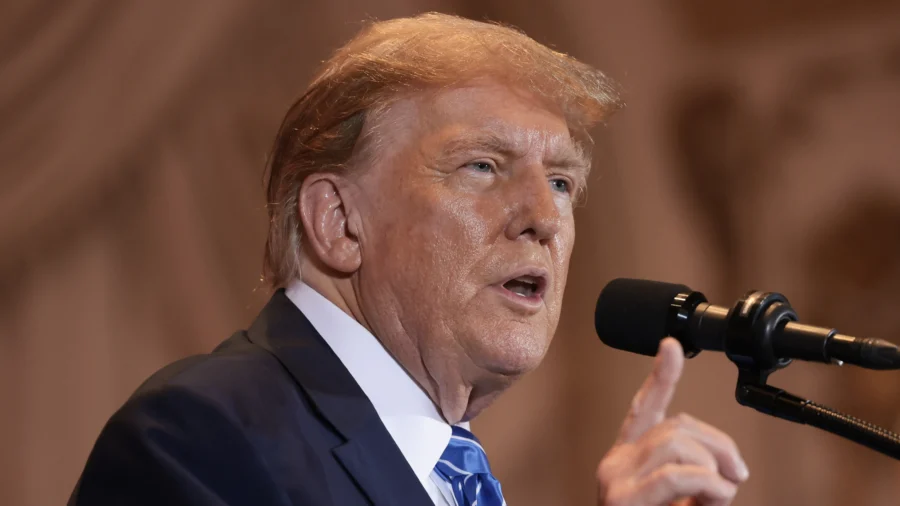The federal judge overseeing one of the criminal cases against former President Donald Trump on March 7 announced an upcoming hearing.
The hearing on President Trump’s motions to dismiss the case against him will be held at 10 a.m. on March 14 in Fort Pierce, Florida, U.S. District Judge Aileen Cannon said.
Lawyers for the government and the defendants, President Trump and former aide Waltine Nauta, “should reserve [a] full day for argument,” the judge added.
Judge Cannon, appointed by President Trump, already held a hearing on March 1 to consider the former president’s request to delay the trial in the case, which involves charges over his retention of classified documents after leaving the White House. She has not yet said whether she would side with President Trump and move the trial beyond the November presidential election.
If the judge rules in favor of President Trump’s motions to dismiss, no trial would be held.
President Trump’s lawyers said in filings that the case should be thrown out because he has presidential immunity, and because under federal law, he was able to designate any government document as a personal record.
“Presidential immunity from criminal prosecution for official acts draws support directly from the text of the Constitution, as the Impeachment Judgment Clause states that a president cannot be criminally prosecuted unless he is first impeached and convicted by the U.S. Senate,” they said in one of the motions.
The Presidential Records Act, meanwhile, “conferred unreviewable discretion on President Trump to designate the records at issue as personal,” meaning his possession of them is not unauthorized as prosecutors have alleged, the lawyers wrote in another filing.
Mr. Nauta, one of two co-defendants in the case, joined in one of the motions.
Prosecutors have offered opposing arguments, trying to convince Judge Cannon not to dismiss the case.
In one, Special Counsel Jack Smith’s team said the Presidential Records Act does not authorize possession of classified information by former presidents.
“Whatever authorization a former president may have to possess his personal records, that authority does not override the legal requirements that attach to classified information,” they said.
In a second filing, prosecutors claimed President Trump’s retention of classified documents differed from how President Joe Biden kept classified materials.
Special Counsel Robert Hur recently found evidence the latter willfully kept classified documents on Afghanistan but determined the evidence fell short of concluding guilt of willful retention beyond reasonable doubt. Mr. Hur was appointed by Attorney General Merrick Garland, who was appointed by President Biden.
The “strength of the evidence” means the cases are not “similarly situated,” prosecutors said.
They said the lack of charges against eight other instances of former officials who retained records, including former President Bill Clinton, did not rise to the level of President Trump’s actions in part because he allegedly obstructed authorities who tried to retrieve the records.
Prosecutors also told Judge Cannon that agreeing with President Trump’s presidential immunity arguments could result in “sobering” consequences.
“Under his view, a President could direct the Special Forces to murder his principal political opponent. He could accept a bribe in exchange for steering a lucrative government contract to the bribe-payer, and he could sell classified information to an adversary, and as long as he was not impeached by the House and convicted by the Senate, he could act with impunity,” they said. “And the enlargement of immunity that he offers in this case—protecting not only acts during the presidency but telescoping outward to shield post-presidency conduct—would be particularly dangerous, setting the stage for all manner of reckless and forward-looking criminal acts during the final days of a president’s term.”
Mr. Smith was also appointed by Mr. Garland.
The back-and-forth on motions to dismiss came after Judge Cannon allowed several third-party groups to file briefs in the case that support President Trump’s arguments. The groups include America First Legal Foundation, which is headed by former Trump administration official Stephen Miller.
“The court has reviewed the motions and finds that the proposed amici bring to the court’s attention [a] relevant matter that may be of considerable help to the court in resolving the cited pretrial motions,” Judge Cannon wrote in an order. “The amicus briefs are accepted for court consideration.”
The brief from the foundation asserted that the National Archives and Records Administration’s referral to the Department of Justice, which led to the indictment, violated federal law. If not struck down, the move would “dangerously expand the ability of an incumbent president to harass a former president by seizing documents based on the request of any agency for nearly any reason,” the brief stated.
From The Epoch Times

